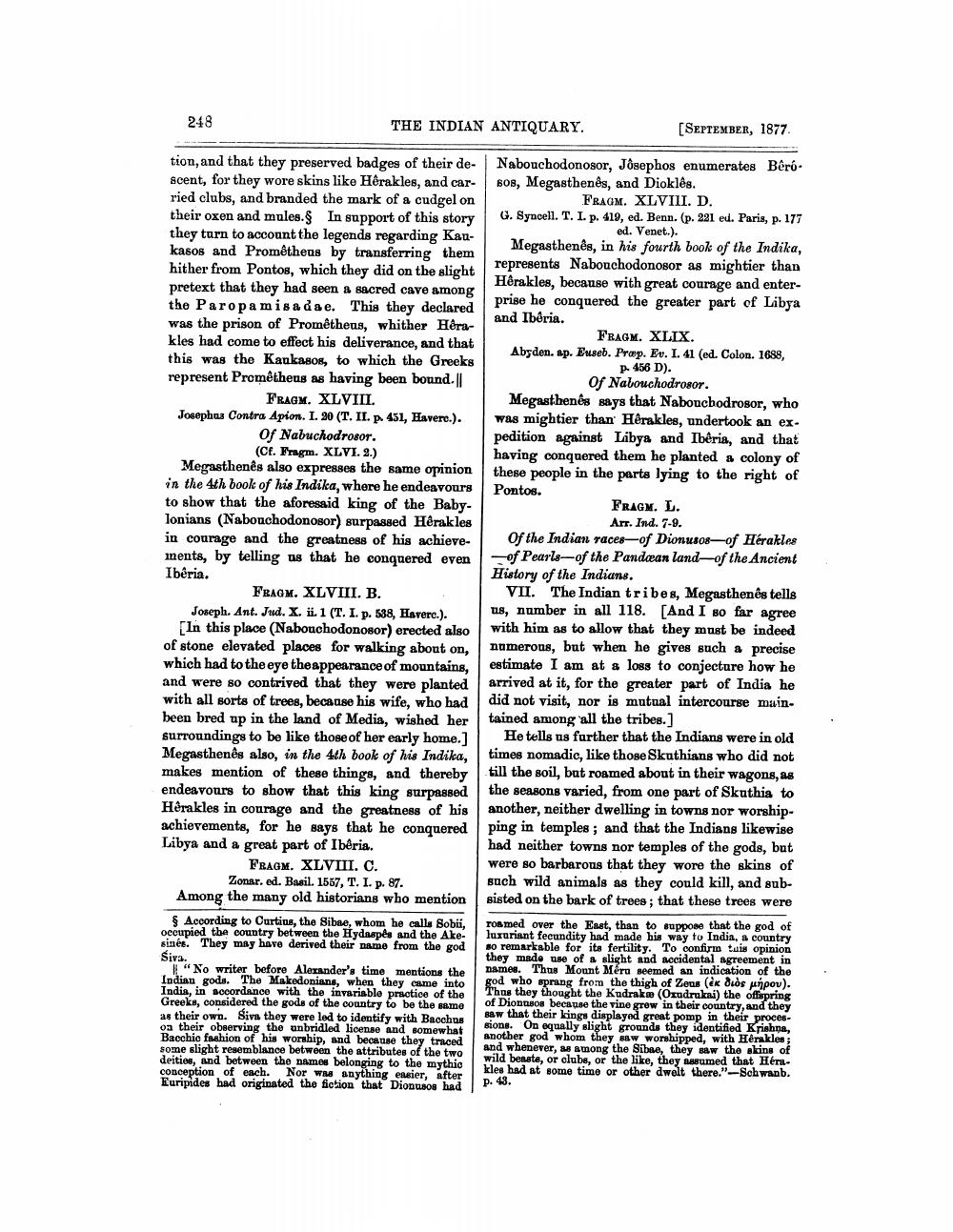________________
248
THE INDIAN ANTIQUARY.
[SEPTEMBER, 1877
tion, and that they preserved badges of their de- scent, for they wore skins like Hôrakles, and carried clubs, and branded the mark of a cudgel on their oxen and mules. In support of this story they turn to account the legends regarding Kaukasos and Promêtheus by transferring them hither from Pontos, which they did on the slight pretext that they had seen a sacred cave among the Paropa misa dae. This they declared was the prison of Promethens, whither Herakles had come to effect his deliverance, and that this was the Kaukasos, to which the Greeks represent Prométheus as having been bound. ||
FRAGM. XLVIII. Josephus Contra Apion. I. 20 (T. II. p. 451, Havere.).
of Nabuchodrosor.
(CE. Fragm. XLVI. 2.) Megasthenês also expresses the same opinion in the 4th book of his Indika, where he endeavours to show that the aforesaid king of the Babylonians (Nabouchodonosor) surpassed Hérakles in courage and the greatness of his achieveients, by telling us that he conquered even Ibêria.
Fragm. XLVIII. B. Joseph. Ant. Jud. X. ü. 1 (T. I. p. 538, Haverc.). [In this place (Nabouchodonosor) erected also of stone elevated places for walking about on, which had to the eye theappearance of mountains, and were so contrived that they were planted with all sorts of trees, because his wife, who had been bred up in the land of Media, wished her surroundings to be like those of her early home.] Megasthenês also, in the 4th book of his Indika, makes mention of these things, and thereby endeavours to show that this king surpassed Hērakles in courage and the greatness of his achievements, for he says that he conquered Libya and a great part of Ibêria.
FRAGM. XLVIII. C.
Zonar. ed. Basil. 1567, T. I. p. 87. Among the many old historians who mention
According to Curtius, the Sibae, whom he calls Bobii, occupied the country between the Hydaspes and the Akesinés. They may have derived their name from the god Siva.
"No writer before Alexander's time mentions the Indian gods. The Makedonians, when they came into India, in socordance with the invariable pricotice of the Greeks, considered the gods of the country to be the same as their own. Sivs they were led to identify with Bacchus on their observing the unbridled license and somewhat Bacchic fashion of his worship, and because they traced some slight resemblance between the attributes of the two deities, and between the names belonging to the mythic conception of each. Nor was anything easier, after Euripides had originated the fiction that Dionusos had
Nabouchodonosor, Jôsephos enumerates Bêró. BOB, Megasthenes, and Dioklês.
FRAGM. XLVIII. D. G. Synoell. T. I. p. 419, ed. Benn. (p. 221 eu. Paris, p. 177
ed. Venet.). Megasthenes, in his fourth book of the Indika, represents Nabonchodonosor as mightier than Hôrakles, because with great courage and enterprise he conquered the greater part of Libya and Ibéria.
FRAGM. XLIX. Abyden. ap. Euseb. Prep. Ev. I. 41 (ed. Colon. 1688,
p. 456 D).
Of Nabouchodrosor. Megasthenes says that Naboucbodrosor, who was mightier than Herakles, undertook an ex. pedition against Libya and Iberia, and that having conquered them he planted a colony of these people in the parts lying to the right of Pontos.
FRAGM. L.
Arr. Ind. 7-9. Of the Indian races-of Dionusos—of Herakles -of Pearls-of the Pandæan land- of the Ancient History of the Indians.
VII. The Indian tribes, Megasthenes tells tus, number in all 118. [And I so far agree with him as to allow that they must be indeed numerous, but when he gives such a precise estimate I am at a loss to conjecture how he arrived at it, for the greater part of India he did not visit, nor is mutual intercourse muintained among all the tribes.]
He tells us further that the Indians were in old times nomadic, like those Skuthians who did not till the soil, but roamed about in their wagons, as the seasons varied, from one part of Skuthia to another, neither dwelling in towns nor worshipping in temples; and that the Indians likewise had neither towns nor temples of the gods, but were so barbarous that they wore the skins of such wild animals as they could kill, and subsisted on the bark of trees; that these trees were roamed over the East, than to suppose that the god of luxuriant fecundity had made his way to India, a country so remarkable for its fertility. To confirm tuis opinion they made use of a slight and accidental agreement in names. Thus Mount Mêra seemed an indication of the god who sprang from the thigh of Zeus (ek dios uńpov). Thus they thought the Kudrakw (Oxudrukai) the offspring of Dionnson because the vine grow in their country, and they saw that their kings displayed great pomp in their proces. sions. On equally slight grounds they identified Krishna, another god whom they saw worshipped, with Herakles; and whenever, as among the Sibee, they saw the skins of wild benste, or clubs, or the like, they assumed that Héra. kles had at some time or other dwelt there."-Schwanb. p. 93.




